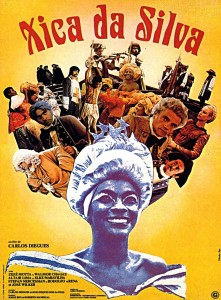
 Director: Carlos Diegues
Director: Carlos Diegues
Writers: Antonio Callado, Carlos Diegues, João Felicio dos Santos
Actors: Zezé Motta, Walmor Chagas, Altair Lima
Production Co.: Embrafilme, Terra Filmes
Country: Brazil
Year: 1976
Language: In Portuguese with English subtitles.
Format: VHS
[ratings]
Summary: A diamond rush in the 1700s transformed Brazil’s interior into a place of wealth and excess. In this unrestrained atmosphere, the slave Xica used her iron will and her sexual talent to seduce her way into becoming the unofficial Empress of Brazil. This outrageous comedy is a festive exercise in Brazilian baroque. Based on the historic novel Xica da Silva (1976) by João Felício dos Santos.
This film, although carnivalesque in nature, highlights and examines an important complex- that of the oppressor and the oppressed. Once Xica da Silva, the protagonist, escapes her situation of oppression and gains power, she acts as her oppressors did, perpetuating the cycle. Something I liked less about the film was that Xica da Silva’s sole method of rising and maintaining power was her sexual prowess.
“Xica da Silva” is another example of a movie that has some valuable historical education, but is arguably too exaggerated and cheesily comical to be taken completely seriously. The main character after whom the film is titled, Xica, is a black slave in eighteenth century Brazil. She ascends up the social hierarchy and defies racial and gender norms by winning over the heart of a powerful Portuguese nobleman. She, in this way, uses her body and sexual prowess as a power holds over a man who is already quite important in status. It was interesting to again see power and eroticism come into play together. I wish the makers of this film had perhaps attempted to portray a slightly more realistic element to it instead of spoofing it in certain ways, but I thought on the whole it added significant value to my understanding of Brazilian colonial period history and the ever-interesting connection between power and sex in society. I recently heard a quote that stuck with me and I feel it relates. “Everything in life is about sex. Except sex. Sex is about power.” – House of Cards
The film follows a slave woman, Xica, who ascends into the higher class through sexual relations with men in power. She uses her sexuality to take inver her subjugation as a slave. While the film makes it a point to show how Xica transforms from the oppressed to the oppressor, the film is not so much about the immediate interactions in the town but rather the exploitation of resources. These resources include but are not limited to: land, natural resources (minerals), and human capital (slaves). The characters in the film are never satisfied and seek to be fulfilled without regard to how that impacts those around them and perpetuates an environment of selfishness and capitalistic tendencies.
“Xica da Silva” follows the story of an enslaved woman, Xica, who uses her sexuality to escape her life of servitude. The film portrays Xica as an empowered woman whose every act is a means to an end. However empowered, the protagonist’s strong sexuality overshadows the surprising fact that a film released in 1976 stars a black woman.
It is interesting to note that the film was created as a criticism of the exploitation of natural resources in Brazil. Much of the power of such a message is lost in the comical tone of the movie and its emphasis on scenes featuring erotic encounters. While a light-hearted, entertaining watch, much of the creator’s intended message is lost.